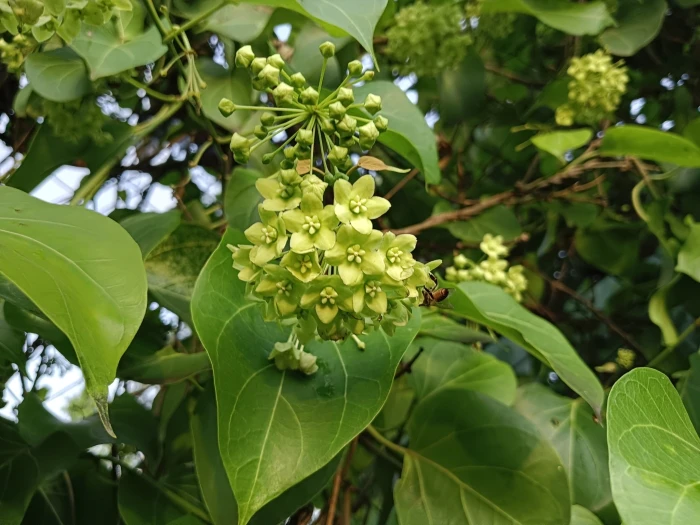(Stephanotis volubilis)
(Stephanotis volubilis)
/
/

renjus box
CC BY 4.0
Image By:
renjus box
Recorded By:
Copyright:
CC BY 4.0
Copyright Notice:
Photo by: renjus box | License Type: CC BY 4.0 | License URL: http://creativecommons.org/licenses/by/4.0/ | Rights Holder: renjus box | Publisher: iNaturalist | Date Created: 2023-07-09T06:33:15-07:00 |
























Estimated Native Range
Climate Requirements for Davenport, Iowa
| This Plant | Your Site | Plant Suitability for Your Location | ||
|---|---|---|---|---|
| • Precipitation | 16" - 216" | 36" | Aquatic | Aquatic |
| • High Temp. | 68°F - 109°F | 86°F | Your summer temperatures are normal for this plant. | Excellent |
| • Low Temp. | 40°F - 78°F | 12°F | Your winter temperatures may be too cold for this plant | Too cold |
This plant should grow well at your location with about N inches per year (Y minutes per month) of irrigation.
Summary
Bridal Veil, also known as Madagascar Jasmine or Bridal Wreath, is a vigorous evergreen vine native to Pakistan, S China and Malesia and widely cultivated in tropical and subtropical regions. It can grow up to 20 feet (6 meters) in length with a twining growth habit. The plant features glossy, dark green leaves and clusters of highly fragrant, waxy, white flowers that bloom from spring to fall, making it highly ornamental. The flowers are particularly showy and often used in bridal bouquets, hence one of its common names.
Madagascar Jasmine thrives in warm climates and is popular for its sweet-scented flowers and attractive foliage. It is often grown on trellises, arbors, and walls, and can also be cultivated as a houseplant in cooler climates. It requires well-drained soil, regular watering, and bright, indirect light to partial shade. Overwatering or poor drainage can lead to root rot, while insufficient light may reduce flowering. It is not tolerant of frost and should be protected from cold temperatures. In cultivation, it is relatively low-maintenance but may need support for its climbing habit.CC BY-SA 4.0
Madagascar Jasmine thrives in warm climates and is popular for its sweet-scented flowers and attractive foliage. It is often grown on trellises, arbors, and walls, and can also be cultivated as a houseplant in cooler climates. It requires well-drained soil, regular watering, and bright, indirect light to partial shade. Overwatering or poor drainage can lead to root rot, while insufficient light may reduce flowering. It is not tolerant of frost and should be protected from cold temperatures. In cultivation, it is relatively low-maintenance but may need support for its climbing habit.CC BY-SA 4.0
Plant Description
- Plant Type: Vines
- Height: 6-18 feet
- Width: 3-6 feet
- Growth Rate: Moderate
- Flower Color: White
- Flowering Season: Summer
- Leaf Retention: Evergreen
Growth Requirements
- Sun: Full Sun, Part Shade
- Water: Medium
- Drainage: Fast, Medium
Common Uses
Fragrant, Potted Plant, Showy Flowers
Natural Habitat
Native to tropical and subtropical regions
Other Names
Common Names: Hawaiian Wedding Flower , Madagascar Jasmine
Scientific Names: Stephanotis volubilis , Ampelamus volubilis , Apocynum tiliifolium , Asclepias viridiflora , Asclepias viridiflora , Asclepias volubilis , Chlorochlamys celebica , Cynanchum viridiflorum , Cynanchum viridiflorum , Dregea angustifolia
GBIF Accepted Name: Stephanotis volubilis